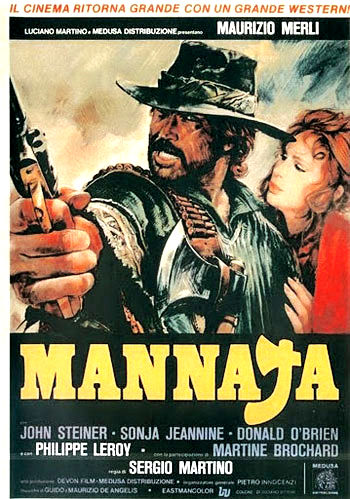 Maurizio Merli plays Blade, so named because he’s a bounty hunter as proficient with a hatchet as he is with a six-gun.
Maurizio Merli plays Blade, so named because he’s a bounty hunter as proficient with a hatchet as he is with a six-gun.
Burt Craven knows that. He’s just had his right hand hacked off when Blade captured him for the $5,000 price on his hand.
Blade takes his prisoner to Suttonville figuring to collect his reward. But Suttonville is a strange little town. The jail is filled with chickens — “real jailbirds,” Blade quips. The saloon is shuttered with a sign on the door that indicates “sin and vice is banned.”
It’s all the doing of a mine owner named McGowan and his head henchman Waller, an old-timer tells Blade.
Of course, Blade might have known that. Seems he has ulterior motives for winding up in Suttonville. And so he sets Craven free and sets about evening an old score with McGowan, discovering in the process that sin and vice is very well alive in Suttonville. In fact, if Waller is involved, they’re thriving.
Salvatore Puntillo plays Johnny Johnny, a traveling pimp who saves Blade’s life along with his five ladies of the evening. Marine Brochard is Angela, one of those ladies, who immediately catches the eye of Blade and vice versa. Sonja Jeannine is Deborah McGowan, the mine owner’s pretty daughter and the central figure in one of Waller’s more devious plots.
In 1977, years after the height of the Spaghetti Western, Sergio Martino manages to direct a film that comes across as fresh and mystical as “Django” did a decade before.
The serious tone helps. You won’t find any of the comic touches that had became the norm in even the bigger-budget Spaghettis by the early 1970s. The imaginative score helps too. The title song is particularly haunting.
And while you’ll probably guess a couple of plot twists before they come, there are enough that you’re probably going to be surprised somewhere along the way.
Oh, and the scene in which Martino jumps back and forth between a fun dance number by Johnny Johnny’s girls and a brutal massacre after a stagecoach robbery was inspired by none other than Sam Peckinpah, our director explains in an interview at the end of the DVD.
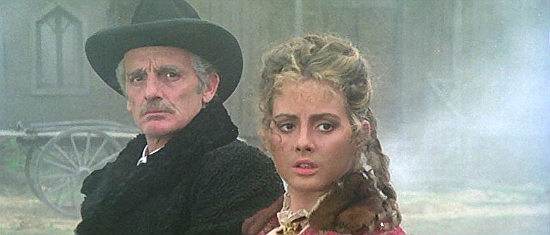
Philippe Leroy as Edward McGowan and his daughter Deborah (Sonja Jeannine) watch Waller and his men attack Blade in A Man Called Blade (1977)
Directed by:
Sergio Martino
Cast:
Maurizio Merli … Blade
John Steiner … Theo Waller
Donal O’Brien … Burt Craven
Sonja Jeannine … Deborah McGowan
Philippe Leroy … Edward McGowan
Marine Brochard … Angela
Salvatore Puntillo … Johnny Johnny
Enzo Fiermonte … Government agent
Rik Battaglia … Gerard Merton
Nino Casale … Dahlman
Enzo Maggio … Old timer
aka:
Mannaja
Score: Guido and Maurizio De Angelis
Title tune: “Wolf”
Runtime: 95 min.
Memorable lines:
Sign on the closed saloon in Suttonville: “Sin and vice are banned in this town.”
Blade: “Those who know me call me blade. Because I sorta got a habit of letting this do my talking for me.” He drops his hatchet on the poker table.
Angela, as Blade snuggles up to her: “None of that. You may be handsome, but you’re just as rotten as every other man.”
Trivia:
You’ll see an awful lot of fog in this film. It was intentional to a) give the film a mystical appearance; b) hide the fact that it was shot in the only remaining Western town in Italy, one that happened to be in disrepair. It would have been too costly to restore the town, Martino says.
While he’s got a wonderfully villainous face, John Steiner, who plays Waller, was the opposite of his character in real life, Martino recalls in an interview on the Blue Underground DVD release of this film. He also was not fond of horses. For that reason, many of his closeups were shot with him sitting on a plank that was being rocked by crew members.
Mauirzio Merli looks a lot like Franco Nero, but that wasn’t the sole reason for casting him in the lead role. At the time, he was a star of police/crime films in Italy. He was 37 when this film was released. He died at age 49 after suffering a heart attack during a tennis match in 1989.
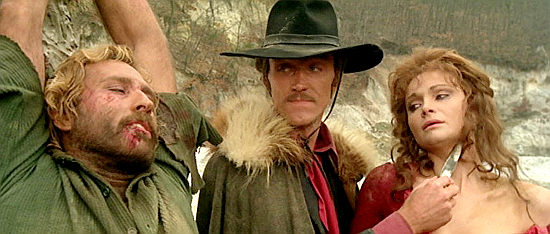
Blade (Maurizio Merli) is in distress and Theo Waller (John Steiner) offers Angela (Marine Brochard) a chance to save him in A Man Called Blade (1977)
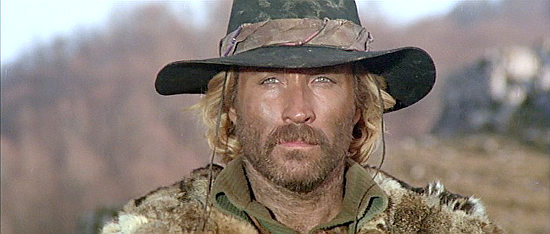
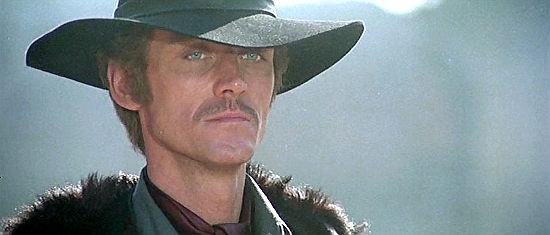

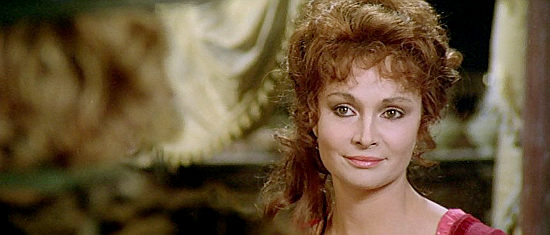
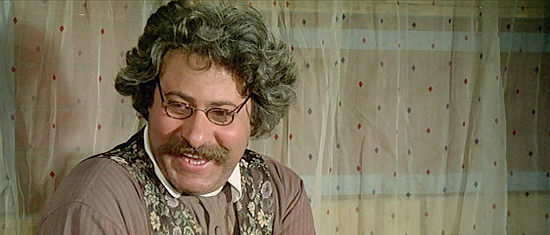
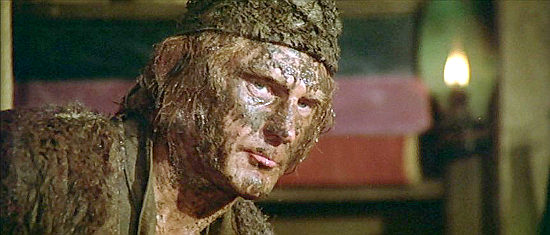
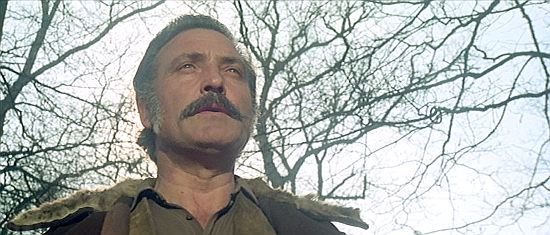
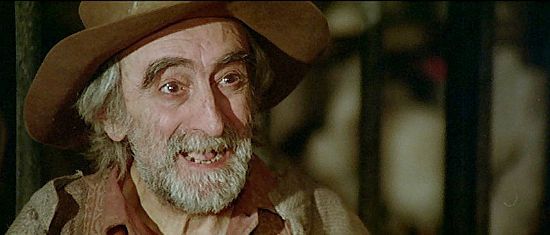
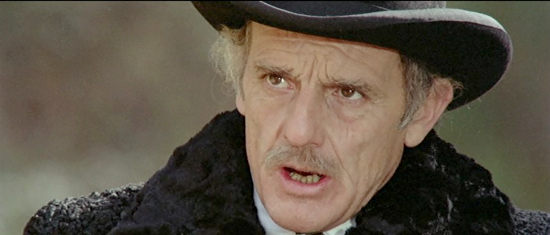
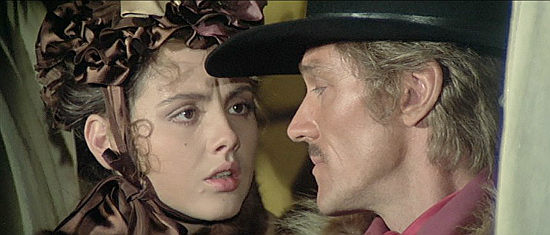
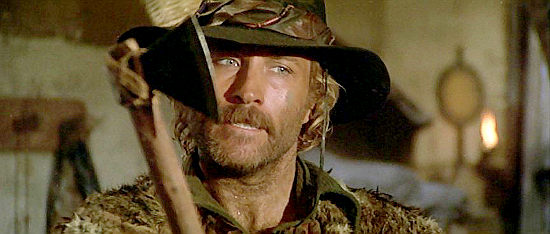
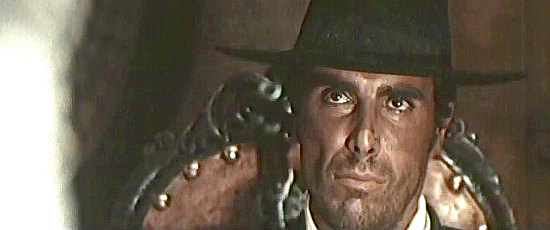
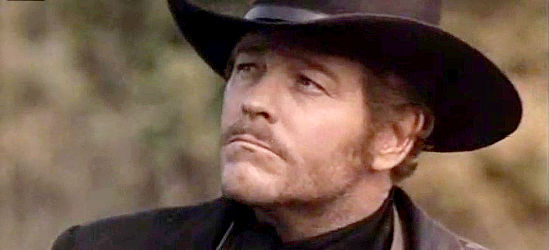
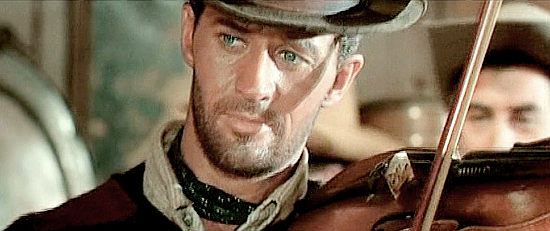
Though it’s no ‘Keoma’, this is really entertaining for a last-gasp effort.